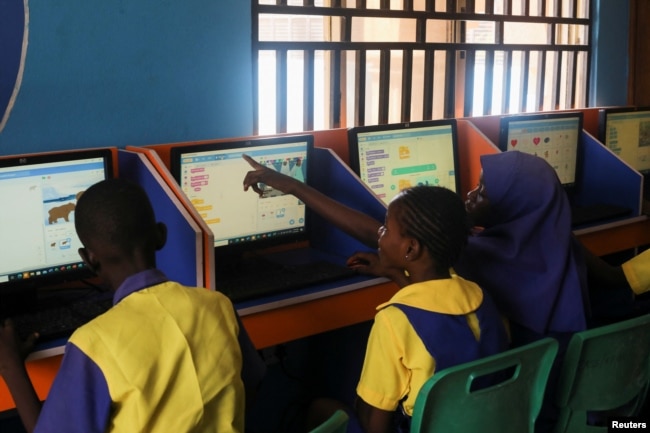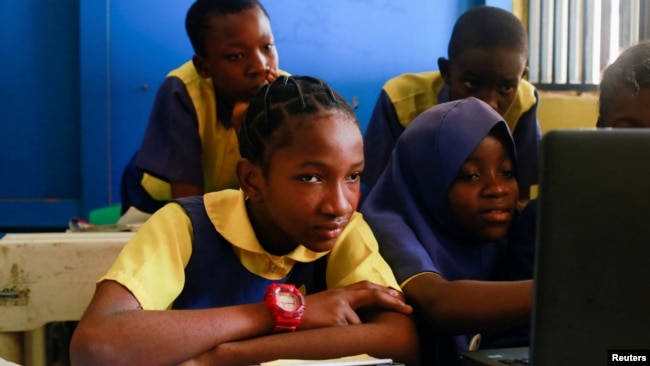貧しい国にこそ質の高い教育を
やはり教育が国家なり!!ですね。
自由に学べる国に住むことに感謝して、自分に”カツ”を入れます!!
さぁ、VOAで英語を学びましょう!!
1日25セントで、貧しいナイジェリアの人々がSTEM教育を受けることができる(和訳)
For 25 Cents a Day, Poor Nigerians Get a STEM Education
3 hours ago
貧困から抜け出したいナイジェリアの学生たちは、1日100ナイラ、約25セント、の費用で科学、技術、工学、数学、すなわちSTEMを学ぶことができます。
ファリダット・バカレは、アブジャにあるクノスク・セカンダリー・スクールに通う12歳の生徒です。彼女は開校から1年後の2020年に入学しました。彼女はエンジニアになりたいと思っています。
同校のテクニカルラボで、彼女はクラスのプロジェクトとして段ボールで作ったソーラーカーの設計図を見せます。
「ロボットとソーラーパネル、そしてすべてのスナップ回路の接続など...そういうものを扱う電気技師になりたいの。」とバカレは語ります。彼女は母親と4人の兄弟と一緒にアブジャの貧しい地域に住んでいます。
クノスク・スクールは、主に寄付金で運営されています。現在82名の生徒が在籍していますが、年々規模を拡大しています。学校関係者が各家庭を訪問し、教育費を負担できるかどうかを確認します。その額は、1学期で159ドルにもなります。
クノスクの創設者であるアイリーン・バングウェル氏は元教師です。貧しい子供たちのための科学高校の構想は、8年前に思いついたと言います。当時、彼女は自分の子どもを病院に連れて行き、そこの清掃員が他の患者に、自分の幼い娘も学校には行かずに清掃員をしていると話しているのを聞きました。
バングウェル氏はさらに、「クノスク・スクールを運営しようと決めたとき、貧しい人の子供が貧困から抜け出すためにはどんな教育が必要かを自問する必要がありました。」と述べています。
彼女は、このような学校をナイジェリアにもっと設立する予定だと話します。
ナイジェリアでは少なくとも1050万人の子供たちが学校に通っていません。国連は1月、これは世界で最も高い割合であると発表しました。最も影響を受けているのは、女の子、障害のある子ども、貧しい家庭の子どもたちです。
※1050万人は、10歳〜19歳で見た場合、おおよそ全体の22.6%にあたる。8歳〜19歳で見た場合は、おおよそ全体の18%。(下記2019年人口資料より計算)
グラフで見るナイジェリアの人口ピラミッド(全年齢・男女別・過去との比較・少子化と高齢社会の考察) | GraphToChart
クノスクの生徒たちは、時間の75%をSTEMの勉強に費やしています。勉強を終えると、生徒たちはそれぞれ、放課後に使えるもの、あるいは継続して開発できるものの設計をしなければなりません。1日25セントの費用で、生徒には服や本、食べ物が与えられます。
ファウサット・バカレさんは、ファリダットの母親です。彼女は、娘がクノスクで教育を受けることが家族の助けになると信じています。
「この子が私の涙を拭いてくれる、この子によって私の苦しみは終わる、と信じています」と、バカレさんは自宅で、市場で売るために地元の野菜であるキャッサバを選びながら言います。
For 25 Cents a Day, Poor Nigerians Get a STEM Education
Nigerian students who want to escape poverty can learn science, technology, engineering and math, or STEM, for the cost of 100 naira, or about 25 cents, a day.
Faridat Bakare is a 12-year-old student at Knosk Secondary School in Abuja. She started in the school in 2020, a year after it opened. She wants to be an engineer.
In a technical lab at the school, she shows a design for a solar-powered car made from cardboard for her class project.
"I want to become an electrical engineer who works with robots and solar panels and all the connections of all the snap circuits and ... things like that," said Bakare. She lives with her mother and four siblings in a poor neighborhood in Abuja.
Knosk School runs largely on donations. The school currently has 82 students, but is expanding each year. School officials visit each family to establish whether they can pay for the cost of education. The amount could be as high as $159 for a term.
Irene Bangwell, the founder of Knosk, is a former teacher. She said the idea of a science high school for poor children came to her eight years ago. At the time, she took her child to a hospital and heard a cleaner there telling another patient that her young daughter was also a cleaner instead of being in school.
Bangwell added, "When we decided to run the Knosk School, we had to ask ourselves what kind of education does (a) poor man's child need to break out of poverty.”
She says she plans to set up more such schools in Nigeria.
At least 10.5 million children in Nigeria do not attend school. The United Nations said in January that is the highest rate in the world. Most affected are girls, children with disabilities and those from poor families.
Students at Knosk spend 75 percent of their time studying STEM. When they finish their studies, each student has to develop a design of something they can use or continue to develop after school. For the cost of 25 cents a day, students are given clothes, books and food.
Fausat Bakare is Faridat’s mother. She believes her daughter’s education at Knosk will help the family.
"I believe that she will wipe away my tears, all my suffering will end through her," Bakare said from her home as she selected cassava, a local vegetable, to sell at a market.
Words in this Story
solar - adj. producing by using the sun's light or heat
cardboard - n. stiff and thick kind of paper used for making boxes
snap circuits - n. pieces or parts that easily fit together
sibling - n. a brother or sister

